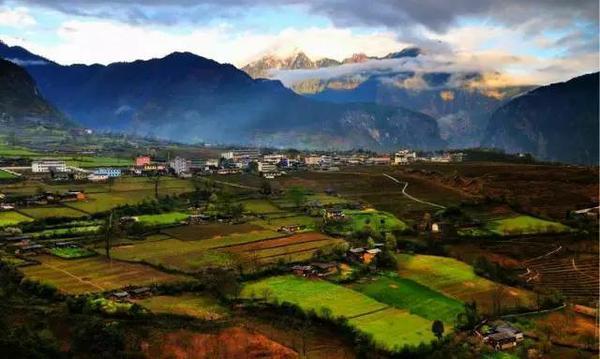
Gongshan County Festivals and Events
The dominant ethnic groups are Dulong and Nu in Gongshan County. Gongshan is a place of gathering of diverse ethnic minorities, with the diverse beliefs and festivals. Here are some major festivals and activities of Gongshan Dulong and Lisu Autonomous Prefecture. They can help you learn more about local ethnic culture.
Kaquewa Festival(New Year Festival) of Dulong People 卡雀哇节
Kaquewa Festival is the only New Year Festival of Dulong people. It is held during the 11th and 12th lunar months, there is no fixed date and the festivals lasts 3-5 days. Every family hangs up the colored tapestry as festival decoration on the first day. They honor the mountain god and hold shooting competition. On the last day, they hold the most exciting activities-killing and sacrificing an ox. They keep drinking, singing and dancing until they enjoy themselves to their hearts’ content.
The Flower Festival of Nu People 鲜花节
It is Nu people’s traditional festival on the 15th day of the 3rd lunar month when all the mountains are covered with blossomed azaleas. It is said that these azaleas bloom to memorize the beautiful girl called Arong who invented the gilding ropes. During this festival, there are varied and interesting recreational activities and the inter-flow of commodities.
The Hill Goddess Festival of Nu People 山母节
It is Nu people’s festival when they worship the hill goddess on the 15th day of the 3rd lunar month. Some worship a hill goddess together with the whole villagers, and some pay respects to a hill goddess with people in several villages. Nu people in different families gather together with dishes to offer sacrifices to ancestors, with the chief as the leader in the sacrificial rites, praying for a good harvest and safety of the family. During the festival, there are varied and interesting recreational activities.
Kuoshi Festival(New Year Festival) of Lisu People 阔时节
The Kuoshi Festival, the Lisu New Year, is the biggest festival among the Lisu people. Regions different, the time of celebration also differs. Generally, the festival lasts from the 5th day of the 12th lunar month to 10th day of 1st lunar month, a period the Lisu people call ‘the Month of Celebration’. During the festival, religious activities of offering sacrifices will be carried out and such amusements as crossbow, dancing, pole climbing and antiphonal-style singing will be held.
Zaotanghui(Bathing) Festival of Lisu People 澡堂会
The Bathing Gathering, also called ‘Tangquanhui’ 汤泉会, are yearly bathing gathering held in spring among the Lisu people living in Nujiang. In the period from 2nd to 6th day of the 1st lunar month, the Lisu people will carry with them luggage and food, and go to the hot springs called ‘the 16 Hot Springs in the Valley’ to have an amazing curing effects and a bathing here can rid them of a year’s pains and misfortunes. In this spring bathing period, song competitions are also held.
The Festival f Climbing Sword-poles of Lisu People刀杆节
It is one of the traditional festivals among the Lisu people, in memory of Wang Ji 王骥, a minister of the Defense Minister in the Ming Dynasty. The story goes that during the time when Wang Ji was an officer in command to garrison the frontiers, he and his soldiers fought bravely, daring to climb a mountain of swords and plunging into a sea of flames. His courage was highly respected and the date of his death, the 8th of August on the Chinese lunar Calendar, was named the The Festival f Climbing Sword-poles. On this day, the Lisu people hold such activities as climbing sword-poles and plunging into a sea of flames to show their bravery.

 7 Days GolfingTour
7 Days GolfingTour
 8 Days Group Tour
8 Days Group Tour
 8 Days Yunnan Tour
8 Days Yunnan Tour
 7 Days Shangri La Hiking
7 Days Shangri La Hiking
 11 Days Yunnan Tour
11 Days Yunnan Tour
 6 Days Yuanyang Terraces
6 Days Yuanyang Terraces
 11 Days Yunnan Tour
11 Days Yunnan Tour
 8 Days South Yunnan
8 Days South Yunnan
 7 Days Tea Tour
7 Days Tea Tour
 8 Days Muslim Tour
8 Days Muslim Tour
 12 Days Self-Driving
12 Days Self-Driving
 4 Days Haba Climbing
4 Days Haba Climbing
 Tiger Leaping Gorge
Tiger Leaping Gorge
 Stone Forest
Stone Forest
 Yunnan-Tibet
Yunnan-Tibet
 Hani Rice Terraces
Hani Rice Terraces
 Kunming
Kunming
 Lijiang
Lijiang
 Shangri-la
Shangri-la
 Dali
Dali
 XishuangBanna
XishuangBanna
 Honghe
Honghe
 Kunming
Kunming
 Lijiang
Lijiang
 Shangri-la
Shangri-la
 Yuanyang Rice Terraces
Yuanyang Rice Terraces
 Nujiang
Nujiang
 XishuangBanna
XishuangBanna
 Spring City Golf
Spring City Golf
 Snow Mountain Golf
Snow Mountain Golf
 Stone Mountain Golf
Stone Mountain Golf












